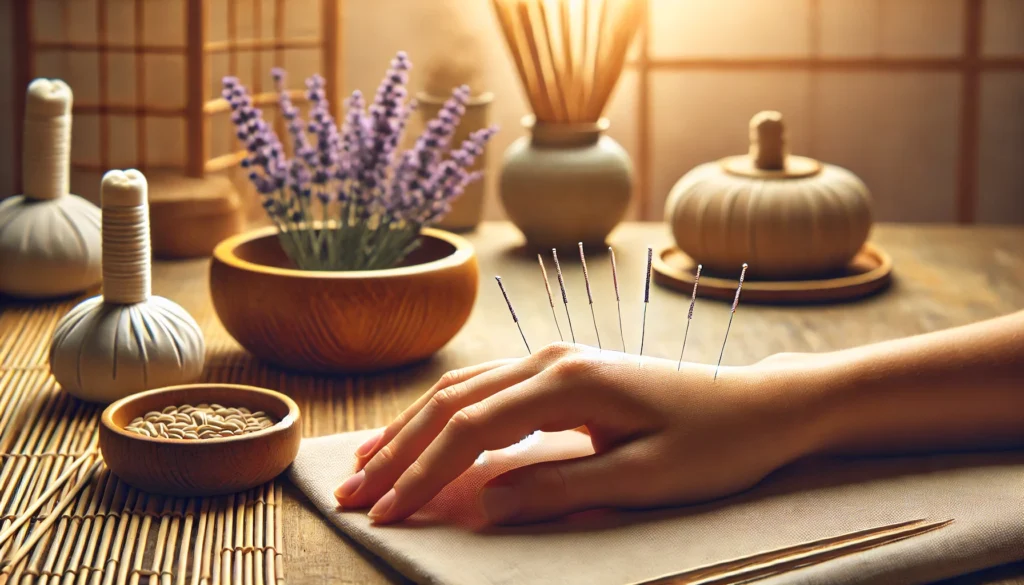Anxiety is a common mental health issue. It affects millions of people worldwide.
Hydroxyzine is often prescribed for anxiety. It’s an antihistamine that can help reduce symptoms.
But not everyone wants to rely on medication. Some people experience side effects. Others prefer a more natural approach.
This article explores alternatives to hydroxyzine for anxiety. We’ll delve into herbal remedies, mind-body practices, and nutritional supplements.
We’ll also discuss lifestyle changes that can help manage anxiety. Plus, we’ll touch on advanced techniques and therapies.
Our goal is to provide a comprehensive guide. We want to help you understand your options.
Remember, it’s important to consult with a healthcare professional before starting any new treatment. Now, let’s dive in and explore natural alternatives to hydroxyzine for anxiety.
You may also like: Top Supplements to Alleviate Anxiety Naturally

Understanding Anxiety and Hydroxyzine
Anxiety manifests in many forms. It includes constant worry and fear. Some experience it as a normal reaction to stress. Others face persistent anxiety without a clear cause. This can impact daily life.
Symptoms vary widely. They may include restlessness, rapid heartbeat, or trouble sleeping. For many, it can feel overwhelming. Therefore, finding effective relief is crucial.
Hydroxyzine is often prescribed for anxiety. Its primary function is as an antihistamine. However, it also acts on the nervous system to reduce anxiety symptoms.
Hydroxyzine works by blocking histamine receptors. This action has a calming effect. It can lessen anxiety symptoms quickly.
Despite its benefits, hydroxyzine is not suitable for everyone. Side effects like drowsiness can hinder daily activities. Some people may also experience dry mouth or dizziness.
Given these limitations, many seek alternatives. They prefer options with fewer side effects. Natural remedies present appealing alternatives. They offer a holistic approach to managing anxiety.
What is Anxiety?
Anxiety is a state of excessive worry or fear. It can be a normal response to stress or uncertainty. However, for some, it becomes chronic and disabling.
Chronic anxiety can interfere with daily life. It affects relationships, work, and personal well-being. Symptoms like restlessness and difficulty concentrating often accompany it. It may also cause physical symptoms, such as sweating or trembling.
How Hydroxyzine Works for Anxiety
Hydroxyzine helps manage anxiety through its action on the brain. It blocks certain receptors to promote calmness. This helps reduce acute anxiety symptoms.
The medication is fast-acting. It’s beneficial for short-term relief from anxiety. By working on the central nervous system, it eases the feeling of tension and unease.
Limitations and Side Effects of Hydroxyzine
Despite its effectiveness, hydroxyzine has limitations. Not everyone tolerates it well. Some experience side effects like drowsiness or dry mouth.
Its sedative properties are not ideal for everyone. It might interfere with daily activities. Those seeking a more active lifestyle may find it burdensome.
These considerations prompt individuals to explore alternatives. Natural remedies and lifestyle changes are attractive options. They offer anxiety relief with fewer side effects.
Herbal Remedies for Anxiety
Interest in herbal remedies for anxiety is growing. Many people seek natural options to avoid the side effects of medications like hydroxyzine. Herbal remedies have been used for centuries, offering a gentler approach to managing anxiety.
Several herbs have shown promise in clinical studies. These herbs are often well-tolerated and can be an effective part of a holistic anxiety management plan.
Incorporating herbal remedies into your routine may provide additional benefits. Many find them soothing, contributing to overall well-being. Here are some popular choices:
- Chamomile: Known for its calming properties.
- Valerian Root: Often used to improve sleep.
- Lavender: Valued for its soothing aroma.
Herbal supplements are typically available in various forms. These include teas, capsules, and essential oils. Selecting the right form for you depends on personal preference and convenience.
It’s important to remember that herbal remedies are not a cure-all. They are best used as part of a comprehensive approach. This includes lifestyle changes and other natural therapies.
Always consult with a healthcare provider before starting any new supplement. This ensures that the remedy is appropriate and safe for your individual needs.
Chamomile
Chamomile is a well-known herbal remedy. It is frequently used for its gentle calming effects. People often drink chamomile tea to unwind after a long day.
Clinical studies suggest chamomile may reduce anxiety symptoms. It is especially helpful for generalized anxiety disorder (GAD). Chamomile contains compounds that work on the brain in a way similar to mild sedatives.
Generally, chamomile is safe for most people. However, those with allergies to ragweed should approach with caution. Always ensure you are using high-quality, organic chamomile products.
Valerian Root
Valerian root has a long history as a natural sedative. It is particularly noted for its ability to improve sleep quality. Poor sleep often exacerbates anxiety, making valerian an ideal choice for some.
The herb works by increasing levels of a neurotransmitter known as GABA. This action results in a calming effect, helping to ease anxious feelings. Valerian root is available in many forms, such as teas and capsules.
Some may find valerian’s scent unpleasant. However, this is a minor drawback considering its potential benefits. As with other herbs, it’s best to start with a low dose to assess tolerance.
Lavender
Lavender is famed for its soothing fragrance. It has been used in aromatherapy for relaxation and stress relief. Its calming scent can be enjoyed through essential oils, teas, or even pillow sprays.
Research supports lavender’s anxiety-reducing properties. It may influence neurotransmitters, promoting relaxation and easing anxiety. Some studies suggest it can be as effective as certain medications for anxiety.
Lavender is versatile and can be incorporated into daily routines easily. However, those with allergies should be cautious. Always perform a patch test when using lavender essential oil for the first time.
Other Herbal Options
In addition to chamomile, valerian root, and lavender, several other herbs can help with anxiety. Each offers unique benefits, broadening the scope of natural treatments.
Consider these:
- Lemon Balm: Known for its anxiety-reducing properties.
- Passionflower: May help with insomnia and anxiety.
- Ashwagandha: Known as an adaptogen that helps manage stress.
- Rhodiola: An adaptogen that supports mental resilience.
Including these in your regimen requires research. Understanding each herb’s effects ensures safe and effective use. This diversity allows for personalized approaches to anxiety relief.

Mind-Body Practices for Anxiety Relief
Mind-body practices have become a cornerstone in managing anxiety. They connect mental processes with physical movements or states. Techniques like meditation and yoga help reduce stress and promote inner peace.
These practices foster awareness and presence in the moment. This mindfulness can significantly reduce anxiety levels. Moreover, they are accessible to everyone, requiring minimal equipment or cost.
Multiple studies confirm the effectiveness of mind-body practices. They show improvements in mood, stress levels, and overall mental health. Not only do these practices help relieve anxiety, but they also enhance physical health.
Incorporating mind-body techniques into your routine can be life-changing. Here are some options to consider:
- Meditation: Calms the mind and increases awareness.
- Yoga: Combines movement and mindfulness.
- Deep Breathing: Utilizes breathing patterns to reduce tension.
- Tai Chi: Integrates slow movements with meditation.
- Progressive Relaxation: Focuses on tensing and relaxing muscle groups.
Consistency is key to reaping the benefits of these practices. As you commit to them, the impact on anxiety becomes more pronounced. Exploration and experimentation will help you find the best practices for your needs.
Meditation and Yoga
Meditation and yoga are powerful tools for managing anxiety. They focus on establishing a mind-body connection, promoting a sense of calm.
Meditation involves sitting quietly while focusing the mind. Breathing or a specific word or phrase can be the focal point. This practice enhances self-awareness and reduces anxiety-provoking thoughts.
Yoga combines physical postures with breath control and meditation. It helps release physical tension and promotes flexibility. The practice of yoga encourages relaxation by calming the nervous system.
Both practices require minimal time commitment each day. Starting with just a few minutes can yield significant benefits. Over time, the positive effects on anxiety may increase as you deepen your practice.
Deep-Breathing and Relaxation Techniques
Deep-breathing exercises are a natural remedy for anxiety. These techniques regulate your body’s response to stress. They promote relaxation by slowing down the heart rate and activating the parasympathetic nervous system.
One effective method is the 4-7-8 breathing technique. Inhale for four seconds, hold for seven, and exhale for eight seconds. This helps maintain focus and calm the mind during stressful situations.
Relaxation techniques such as progressive muscle relaxation are also beneficial. They involve tensing then relaxing different muscle groups. This helps reduce physical symptoms of anxiety, offering a sense of release.
Incorporating these techniques in daily life is simple. Practice them during quiet moments or when anxiety strikes. With time, they can become an automatic response to stress, enhancing overall well-being.
Nutritional Supplements and Diet for Anxiety
Nutritional choices profoundly impact mental health. Certain nutrients play vital roles in mood regulation and stress response. Incorporating supplements and a balanced diet can significantly aid anxiety management.
Our body uses various nutrients to maintain brain health. Deficiencies in these can exacerbate anxiety symptoms. Therefore, providing the right nutrients helps build resilience against stress.
Several dietary supplements are shown to support mental health. They offer a natural way to alleviate anxiety without the side effects of medication. Let’s explore some of these beneficial nutrients.
- Omega-3 Fatty Acids: Boosts brain function and reduces inflammation.
- Magnesium: Supports neurotransmitter function and relaxation.
- B-Complex Vitamins: Essential for brain health and mood stability.
- Probiotics: Improves gut health, affecting mood regulation.
- L-theanine: Found in green tea, promotes calmness without drowsiness.
Incorporating these nutrients into your diet may help ease anxiety. Always aim for a balanced diet rich in whole foods. Consultation with a healthcare provider is advised before starting any supplement regimen.
Omega-3 Fatty Acids
Omega-3 fatty acids are crucial for brain health. These nutrients, found abundantly in fish oils, are linked with reduced anxiety symptoms. They help modulate neurotransmitter activity, improving mood and cognitive function.
Research suggests omega-3s reduce inflammation and influence serotonin, a key mood-regulating chemical. Regular consumption of omega-3s is associated with lower rates of anxiety. Including fatty fish like salmon or taking fish oil supplements can help maintain adequate omega-3 levels.
Magnesium and B-Complex Vitamins
Magnesium plays a key role in mental relaxation. It supports neurotransmitter function that eases anxiety. Low magnesium levels may correlate with increased anxiety symptoms. Foods like nuts, seeds, and whole grains are excellent sources.
B-Complex vitamins, including B6 and B12, are vital for brain function. They support energy production and mood regulation. A deficiency in these vitamins can trigger anxiety. Supplementing with B-Complex can help maintain balance and promote mental well-being.
Probiotics and Gut Health
Gut health significantly impacts mental health due to the gut-brain connection. Probiotics, beneficial bacteria for the gut, may influence mood. They support the production of neurotransmitters like serotonin.
Studies show a healthy gut microbiome can reduce anxiety and improve mood. Consuming fermented foods or probiotic supplements can enhance gut health. This could lead to better mental well-being and decreased anxiety levels.
Lifestyle Changes and Anxiety Management
Lifestyle changes form the foundation of effective anxiety management. By making intentional adjustments, you can enhance mental resilience and overall well-being. Integrating practical strategies into daily life can significantly reduce anxiety symptoms over time.
These changes don’t require drastic measures but rather subtle shifts in habits. Emphasizing consistency and balance is key. Small, sustainable steps often have the most profound impact.
Consider the following lifestyle adjustments for anxiety management:
- Prioritize regular physical activity.
- Ensure quality and sufficient sleep.
- Practice stress management techniques.
- Cultivate supportive social connections.
- Optimize environmental factors.
- Develop structured personal routines.
Adopting these strategies helps create a supportive environment for mental health. When implementing change, listen to your body and adjust as needed. Let’s examine these points in more detail.
Physical Activity and Sleep
Regular exercise is a powerful tool for managing anxiety. Physical activity releases endorphins, natural mood lifters, which can reduce stress and anxiety. It also helps improve sleep quality, a critical component of mental health.
Adequate sleep supports emotional regulation and cognitive function. Ensure your sleep environment is conducive to rest and aim for consistent sleep schedules. Both exercise and sleep build a strong foundation for mental resilience.
Stress Management and Community Support
Effective stress management can greatly reduce anxiety levels. Techniques such as mindfulness, journaling, or deep-breathing exercises can be beneficial. Find what works best for you and make it a daily practice.
Community support plays a crucial role in anxiety management. Engaging with supportive friends, family, or groups can provide relief. Sharing experiences and coping strategies enriches mental resilience and provides emotional support.
Environmental Factors and Personal Routines
Your surroundings can influence anxiety. Reducing noise, improving lighting, and decluttering can create a calming space. A well-organized environment contributes to mental peace and reduces stress.
Creating personal routines fosters a sense of control and predictability. Regular schedules for meals, exercise, and leisure help stabilize mood. Adapt routines to fit your lifestyle and make gradual enhancements for lasting improvements.

Advanced Techniques and Therapies
For those seeking alternatives to traditional anxiety treatments, advanced techniques and therapies offer promising options. These methods often involve tailored approaches that address anxiety through various modalities. By incorporating technology and ancient practices, these therapies can complement other anxiety management strategies.
Some advanced techniques focus on harnessing technology to influence physiological responses, while others draw from ancient healing traditions. Implementing these techniques requires guidance from trained professionals and a willingness to explore new avenues. It’s important to approach these therapies with an open mind and realistic expectations.
Here are some advanced techniques worth considering:
- Biofeedback and neurofeedback
- Acupuncture
- Traditional Chinese Medicine
- Virtual reality (VR) therapy
- Mindfulness-based stress reduction (MBSR)
Together, these methods provide diverse avenues for managing anxiety. They can be an excellent complement to a comprehensive anxiety management plan. Let’s delve deeper into biofeedback, neurofeedback, acupuncture, and Traditional Chinese Medicine.
Biofeedback and Neurofeedback
Biofeedback and neurofeedback are technology-driven therapies that focus on self-regulation. Biofeedback involves monitoring physiological signals like heart rate and muscle tension to promote relaxation. It empowers individuals by teaching them how to control these responses.
Neurofeedback, a specialized form of biofeedback, focuses on brainwave activity. By using real-time displays, individuals learn to adjust brainwave patterns associated with anxiety. These techniques, when conducted by professionals, can lead to significant improvements in managing anxiety symptoms.
Acupuncture and Traditional Chinese Medicine
Acupuncture, a core component of Traditional Chinese Medicine (TCM), uses fine needles inserted into specific body points. This practice aims to balance energy flow, or Qi, and improve mental wellness. Many individuals report a sense of calm and relaxation following treatment.
Beyond acupuncture, TCM encompasses herbal remedies and holistic lifestyle recommendations. This ancient approach considers the mind-body connection, supporting overall well-being. With an experienced practitioner, TCM can serve as a valuable tool for anxiety management.
Conclusion: Personalizing Your Anxiety Relief Plan
Managing anxiety is a deeply individual journey requiring personalized strategies. Exploring a variety of natural alternatives can empower you to find what works best for you. With options like herbal remedies, mind-body practices, and nutritional supplements, there is a wealth of possibilities.
Consider integrating these therapies with lifestyle changes and professional advice to create a comprehensive plan. Embrace a holistic approach, paying attention to both mental and physical well-being. Remember, what suits one person may not suit another, so remain open and adaptable as you discover your personalized path to anxiety relief.
Further Reading:
Vistaril (Hydroxyzine) vs. Xanax (Alprazolam) for Anxiety
Hydroxyzine alternatives: What can I take instead of hydroxyzine?
Hydroxyzine for anxiety: how effective is it?
Important Note: The information contained in this article is for general informational purposes only, and should not be construed as health or medical advice, nor is it intended to diagnose, prevent, treat, or cure any disease or health condition. Before embarking on any diet, fitness regimen, or program of nutritional supplementation, it is advisable to consult your healthcare professional in order to determine its safety and probable efficacy in terms of your individual state of health.
Regarding Nutritional Supplements Or Other Non-Prescription Health Products: If any nutritional supplements or other non-prescription health products are mentioned in the foregoing article, any claims or statements made about them have not been evaluated by the U.S. Food and Drug Administration, and such nutritional supplements or other health products are not intended to diagnose, treat, cure, or prevent any disease.


